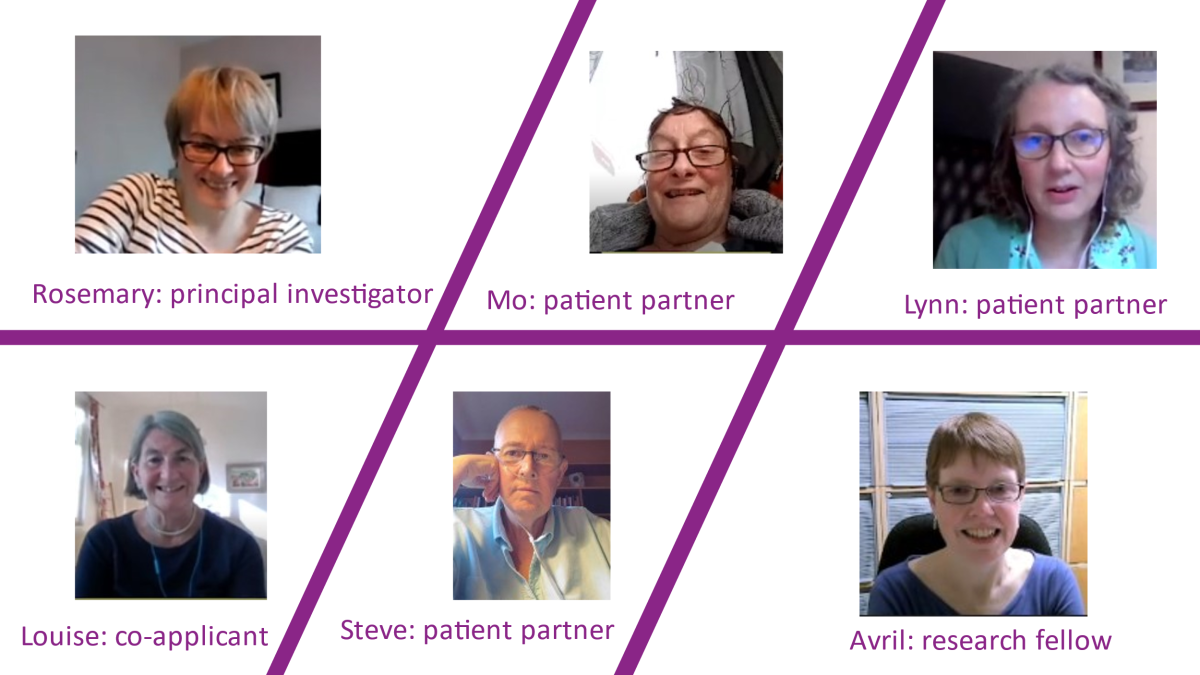As part of HSR UK's continued commitment to improving inclusion in health services research, at this year's conference we presented a new group of awards celebrating excellence in Innovation in Inclusion in Health Services Research, supported by the Health Services Research National Specialty Group in the NIHR Clinical Research Network.
One winner was the VOICES team who impressed the judges – and everyone who attended their session – with their commitment to inclusivity and equity in patient partnership. Louise Locock reflects on their experience on behalf of the VOICES team, especially Rosemary Hollick, Lynn Laidlaw, Mo McBain and Avril Nicoll, and in memory of their colleague Steve Chinn.
Frankly speaking….conversations about PPI
I’ve been ‘doing’ PPI for twenty years and researching it for nearly ten. It wasn’t always so – when I look back at my early research career the idea that patients should be involved was simply absent. Like many of us, I suspect, I’ve continuously had to change my thinking and my practice over that time.
In health services research it seems to me that partnership with patients and the public is gradually maturing into a less controlled, more egalitarian space. Sarah Knowles and colleagues have described this as ‘more than a method’, characterised by ‘trusting relationships, productive tensions, and two-way learning’. (It’s a great paper; if you haven’t read it, you should!)
In our project on experiences of and care for people with vasculitis (VOICES), we are a mixed bunch. Alongside our patient experts, Lynn Laidlaw, Mo McBain and the late Steve Chinn, we have Rosemary Hollick (Consultant Rheumatologist and clinical academic), Avril Nicoll (a former speech and language therapist and now a health services researcher) and me (a health services researcher and former – very former - NHS manager).
For our HSRUK presentation, we filmed ourselves having a conversation about how we work together, the productive tensions we experience, and the trusting relationships we try to build. You can see our full recorded presentation here. Rosemary and Lynn then took to the stage at the conference to share some brief reflections.
We framed our conversation by thinking about the ethic of responsibility we have to each other, to other patients, to our NHS colleagues, and to the quality of the research. Rosemary describes tension between her research and clinical identities. She is constantly aware that any recommendations for service improvement have got to reflect both the views of patients, and what is practical for her clinical colleagues in a time of extreme pressure on the NHS. As a researcher she is committed to involving patients, but as a clinician, she sometimes hesitates to ask patients to get involved because she worries about them feeling pressured to do things when they might be quite unwell.
But this concern is not one-way. I was particularly struck by Mo saying “I feel for Avril” doing the research, and listening to difficult, emotional stories from patients about their illness. There is also a moment when Avril describes getting really stuck in a swamp with analysis, and patient partners helping her find a way through. The image of patients throwing a lifeline to a struggling researcher embodies that mutual sense of care.
We all acknowledge that we still get things wrong; could have worded things better; get the wrong end of the stick when we’re trying to make sense of each other’s views. Both researchers and patient partners come with previous experiences and pre-conceptions in tow. When anyone involved in the research process has had a poor experience, such as being treated in a tokenistic or dismissive way, it can affect how we view new relationships and projects. We have perhaps learnt that discussion by email creates space for misunderstanding and resentment to build, and in-person conversation can defuse miscommunication and lift us out of our silos in an instant. We have all missed the opportunities to build friendships and have a laugh together over a meal, because of the pandemic.
As Lynn says in our recording, ‘It’s about conversation, relationships and collaboration, and you need to create the safe space where the power differentials are openly acknowledged…and where it’s OK to disagree….The magic happens for me in research when we all come together like this…When that happens it’s just the best feeling in the world.’
One audience member commented afterwards that Rosemary and Lynn had ‘modelled the joy and challenges of involvement’. We were bowled over to receive one of the HSRUK’s awards for innovation and inclusion. It feels a bit strange to say that having mutually caring and reflective conversations is in any way ‘innovative’, but perhaps it is indicative of the fact that, however far we have come with patient and public involvement, there is still a long way yet to travel.
